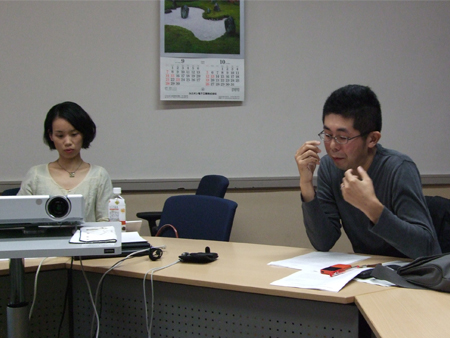Report: Seminar “Secularization, Religion, State” Session 10
On October 20th, the tenth session of the Seminar “Secularization, Religion, State” was held.
In this session we had a workshop “Secularization and Society in Egypt” KATSUNUMA Satoshi (research fellow, UTCP) and GOTO Emi (collaborative research fellow, UTCP) made presentations. Dr. Lombardi, associate professor of law at the University of Washington, kindly accepted the role of commentator in the workshop.
At first, Katsunuma made a presentation titled “Penal code and penal policy in Egypt under the British occupation, 1883-1903.” In 1883, the Egyptian government introduced a new penal code of the French model. Yet it has not yet been examined how the Egyptian government tried to adjust the penal code to the situation of Egyptian society until this penal code was fully replaced by another one, enacted in 1904. Katsunuma used as sources the proceedings of the Legislative Council which was the consultative body created under the British occupation. He pointed out that the Egyptian government strengthened control over the brigandage and applied harsher punishment to larceny, besides trying to oblige more convicts to work inside prisons than ever before. He also indicated that this penal policy and prison reforms conducted mainly by Charles Coles, inspector general of the prison department, affected the revision of the Egyptian penal code in the early days of the British occupation. Responding to his presentation, Dr. Lombardi commented on the relationship between the revision of the Egyptian penal code and the policy of British occupation, and on the reaction of the Egyptian society to this revision.
Second, Goto made a presentation titled ““Secular” vs. “religious”? The relation between Islam and the veil in contemporary Egypt.” Whether wearing the veil is based on Islam is discussed among the intellectuals not only in the Middle East, but also in France, which has a great population of Muslim. Goto took up the debate between al-Ashmawi and Tantawi which was held in a magazine. al-Ashmawi insisted that wearing the veil is not based on Islam, but Tantawi argued that it is based on Islam. Both seemed to rely on authoritative sources, such as the verse of the Qur’an, hadith, tafsir, and books of law, to develop their arguments. They chose the sources and parts of the texts in an arbitrary manner, however. In the conclusion, Goto indicated that the dichotomy between “unveiling=secular” and “veiling=religious” is not appropriate and that there should be factors that make a woman decide whether or not to opt for the veil, besides the social situation and human relationship which were indicated in the preceding studies. Dr. Lombardi put a high value on her methodology, that is drawing a conclusion strictly based on the sources. Then he commented that we must consider what materials we admit as sources of Islamic law, who is qualified to interpret Islamic law, and in which methods the interpretation is done. In addition, a definition of the term “Islamize” was discussed.
Reported by OTA Keiko






